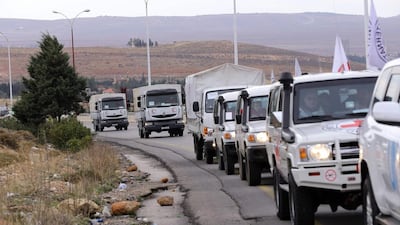Two weeks before an aid convoy delivered food and medicine to the 42,000 people of Madaya, a representative for the town’s council made an urgent appeal to the UN office responsible for the region. The town had been strangled since July 2015 by Bashar Al Assad’s army and the Lebanese Hizbollah. The condition was precarious: inhabitants were subsisting on grass, cats, dogs, insects, salt and water. At least 28 had died of starvation since the beginning of December. The council representative received an automated reply: the staff were away until January 5.
On New Year’s Eve, when the UN chief Ban Ki-moon wished his Twitter followers a peaceful 2016, he made no mention of the unfolding tragedy.
The inertia was broken when a determined social media campaign forced Madaya on the world’s attention and, eventually, the UN relented. On January 7, the regime agreed to allow a one-off supply of aid. The UN was quick to praise the regime for this concession, but it took another four days before it delivered aid to the town. The delay resulted from the “complexity” of synchronising deliveries to the 12,000 inhabitants of Al Fu’a and Kefraya, two pro-regime villages in Idlib encircled by rebels. On entering the town, aid workers were shocked by the “horrifying” conditions. “There are people in Madaya, but no life,” said Sajjad Malik, the UNHCR chief in Syria. “They are fighting for survival. No food, no electricity, no heating, no medicines. People did not even have the energy to complain.”
The representative for the UN’s Office of Coordination of Humanitarian Affairs in Syria, Yacoub El Hillo, too was moved: “We saw a people that are desperate; a people that are cold; a people that are hungry; a people that have almost lost hope”.
But in a curious statement, Mr El Hillo added that before entering Madaya, “it was at times difficult to determine whether what we were seeing was actually fabricated or exaggerated”.
It is unclear why Mr El Hillo should’ve faced such difficulty. The conditions in Madaya had been known to the UN for months. This scepticism may be unfounded but it is consistent with the state-centric bias of the UN’s humanitarian practices. UN agencies are required to respect state sovereignty regardless of legitimacy. And in Syria, they have been reluctant to act without the consent of the regime. This has turned the UN into an unwitting agent of the status quo, allowing the regime to politicise aid.
It has since emerged that in compliance with the regime’s wishes, the UN also censored its “humanitarian response plan” to downplay the enormity of the regime’s crimes and thereby foreclose the possibility of assistance or accountability.
For nearly four years the regime has used food and medicine as a weapon of war. It started in April 2012 by bombing breadlines, bakeries and hospitals. Since the siege on the Yarmouk refugee camp in 2013, the regime escalated to a “surrender or starve” strategy. Rebellious regions were punished or rewarded based on their willingness to submit. Of the 91 requests for aid delivery made by the UN to the Syrian regime last year, only 13 were allowed to proceed. Consequently the UN delivered aid not to where it was most needed, but where it best served the regime’s interests.
Madaya’s inhabitants represent just 1 per cent of the 4.5 million Syrians trapped in the “hard-to-reach” areas and 10 per cent of the 400,000 under siege in 52 towns (49 of them by the regime, one by ISIL, and two by the rebels). The price of rice offers a measure of the relative severity of the different sieges: a kilogram in rebel besieged Kefraya is $1.25. In ISIS besieged Deir Ezzor, it’s $5. In regime besieged Madaya it’s $256.
Still, the horrors that the UN rep witnessed in Madaya did not prevent him from the anodyne apportioning of blame to “all parties to this conflict”.
Mr El Hillo’s language is part of the compromises humanitarian agencies have to make to function in places such as Syria. But this artificial levelling of moral responsibility normalises repression and diminishes any possibility of accountability thereby removing a potential deterrent to war crimes.
Following the Russian intervention, Mr Al Assad is secure in his power. And escalating war crimes notwithstanding, the UN is now facilitating his rehabilitation. Given the West’s exclusive focus on ISIL, the UN lacks leverage. Consequently the regime, backed by Russia, has been able to dictate its terms. It is using the Vienna “peace process” as a temporising measure while consolidating militarily. Meanwhile the sieges are tightening around other towns such as Moadamiyeh.
Two decades ago, in Srebrenica, a UN peacekeeping force disarmed a Bosnian town and promised it protection before allowing a Serb force to march in and execute over 8,000 men.
It also stood by as tragedy unfolded in Rwanda. Since then, these failures have been the subject of extravagant colloquia. But ritual breast-beatings about the past seem to have done little to equip the UN to better handle crises in the present. As long as the sieges remain, we’ll do well to remember that it was vigorous public advocacy rather than quiet diplomacy that broke the siege.
Dr Muhammad Idrees Ahmad is a lecturer in digital journalism at the University of Stirling. He is writing a book on the war of narratives over Syria
On Twitter: @im_pulse

